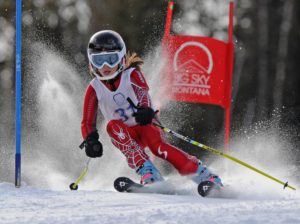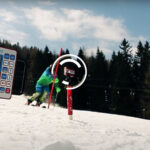I come to this article from two directions. First, as a sport psychologist who has worked ski racers and their parents for decades. There is no doubt that my experiences in helping racers to achieve their goals and assisting parents in best supporting their children has informed my ideas here.
At the same time, perhaps more importantly, I come to this article as the father of two burgeoning ski racers (11 and 9) with whom I am sharing their journey. These experiences, which are much more personal, immediate, and visceral, inform this article in a much deeper and more meaningful way.
Let me preface my thoughts by sharing an emotion with you: humility. As many of you know by now, I’m a fairly opinionated fellow who is all too happy to share what I believe is right and wrong, good and bad. However, in my advanced age and growing experience as a father, I have adopted a degree of humility in the face of the massive responsibilities we have as parents. Though I don’t always voice it, I recognize that there are many roads to raising happy, successful, and value-driven kids. In my own growth as a person and as a parent, I realize that I don’t have all the answers for every family. Instead, my goal is not to tell you how to raise your children, but rather to ask essential questions, raise important issues, and challenge you to be conscious and deliberate in the choices you make about your kids as they pursue their ski racing dreams (or just try to go as fast as they can).
This article is aimed mostly at the beginning of the ski racing pipeline, that is, U14s and younger, where the foundation of young racers’ attitudes are laid which often determine how long they stay in our amazing, yet demanding, sport and the degree of success that they have as ski racers.
So, here goes.
What Young Ski Racers Need
Your equanimity on race day. At the U12 and U10 races I’ve been to this season, I have seen parents who are far too excited when their kids do well and far too disappointed when they don’t. These parents have entered what I call the “too” zone, where their kids’ ski racing has already (remember they are 11 years old or younger) gotten, well, too important and they are too invested in how their kids do.
Your most powerful influence on your children isn’t in what you say or even what you do with your children. Rather, the most potent messages you convey to them are your emotions because they are processed at a very intuitive level. So, when you are really nervous before a race, or excessively excited or unusually despondent after a race, your kids get the message that the results they get are REALLY important to you. And that creates expectations and pressure, and just sucks the fun out of ski racing. Plus, I see far more tears from young racers on race day than should ever be seen at this age in our sport. Kids cry because they have also entered the “too” zone and guess who led them there?
My advice: Chill out! Sure, get vicarious pleasure from your children’s successes and feel empathy when they crash or go slow. But keep yourself calm and together on race day. If you can’t, stay away from your kids!
Your undivided attention at races. As I noted in a previous article, I see far too many parents watching Live-Timing during and after races rather than watching their kids race and sharing in their amazing experiences in real-time and with real presence. When you do this, you send unhealthy messages to your children and you miss out on what being a ski racing parent is all about, namely, seeing your kids face and overcome the many challenges that our sport presents and seeing that huge smile on their face because ski racing is so fun!
My advice: If you want to send the right message to your children about ski racing, put away your phone, smile, cheer (but not too loudly), and give lots of hugs and kisses.
Your unconditional love. Those overly strong emotional messages that you may be communicating on race day can send an even more harmful message to your children: conditional love. Of course, you love your children, but you don’t always communicate that message to them. Your extreme disappointment can be perceived as “My mommy (or daddy) doesn’t love me when I do bad.” I know it sounds hard to believe that your kids might get that message, but I can assure you that it’s not an uncommon perception from the young racers I work with.
A related message is that your happiness (or unhappiness) is on your children’s shoulders when they get in the starting gate. Your kids don’t need the crushing burden of your happiness weighing them down as well.
A frequent question I’m asked by parents is: What do I say to my kids before and after they race? First, let me say that you don’t have any magical power over how they will ski, in other words, nothing you say will help. But what you say before their race run can hurt. Don’t remind them to do anything technical. It’s not your job and you have no legitimate authority (unless you were an elite racer or coach yourself). Don’t tell them to go fast; they already know that.
After their run, you feel like you have to say something. Common things I hear from parents are: “You were so fast!”, “Did you have fun?”, or, even worse, “Here’s your Live-Timing.” or “You beat Johnny (or Suzie)!”
My advice: Just say three words before and after their race runs: “I love you!” That’s all your kids want or need from you. Okay, you can also say, “Do you want something to eat?”
What Your Ski Racers Don’t Need
As the father of two young racers, I feel what so many parents feel at training and on race day—inadequate!—because I’m not giving my kids what other parents are giving their kids. I don’t give them some of these things for three reasons. First, I don’t value them or believe they are the best thing for my girls’ healthy development. Second, they don’t make any difference in their ski racing experience. Third, my wife and I simply can’t afford them. Given the pressure that parents can feel trying to keep up with the Joneses and how expensive our sport is, I hope my list of Don’t Needs will provide some relief to many of you.
Talk about results. As I’ve discussed in an earlier article, your focusing on results actually interferes with your children getting the results that you and they want. In the short run, a result focus prevents kids from focusing on the process of ski racing and thinking about results is what makes them nervous before races.
In the long run, results at this age mean absolutely nothing. If your kid is winning now, good for him or her. But it says absolutely nothing about where they will be if and when they start racing FIS, which is when results really start to matter. The U.S. Ski Team did a study (thanks for the info, Jon Nolting!) a while back in which they found that early ski racing success, as defined by qualifying for Topolino or Whistler Cup (international competitions for 13-15 year olds) wasn’t highly predictive of success even five years later. Specifically, only 25% of those who qualified for those race series later earned a spot on the USST. Moreover, 35% were off the elite ski racing radar within four years. The remainder went on to compete at the regional and collegiate levels (nothing to be ashamed of, but not where most ski racing dreams begin).
In fact, if you think you have the next Mikaela Shiffrin or Ted Ligety on your hands at eight, ten, or twelve years old, the chances are that he or she won’t even be racing in five years because they would rather play soccer, do ballet, or just stay home with their friends, or our sport has gotten too expensive for your family.
My advice: Never talk about results…ever! It serves no purpose. If your kids do, change the subject to what they did to get the results they wanted or what they need to do to get the results they want or, even better, change the subject completely.
A quiver of skis. I see so many young kids with SL skis, GS skis, and, yes, all-mountain skis. Not only that, on race day, I see a shocking number of U14s and under with race skis and training skis! Here’s my question: What’s the point? To make them faster? My two answers: None and bringing race skis to the start will not make them appreciably faster.
I have to admit that I get perverse pride from the fact that my daughters have only one pair of skis that they use for everything. No, they don’t win, but, despite this horrible disadvantage (note ironic tone), they are doing just fine. If they decide to really commit to ski racing, then they’ll get more skis.
My advice: Let them own their ski racing before they own too many pairs of skis.
Race tunes. Your kids don’t need to have World Cup race tunes for them to ski their fastest. As the inimitable tuning guru, Jim Schaffner, told me a few weeks ago, if their skis have a decent edge and are waxed, they are ready to go. Grinds and bevels just don’t matter at this age. And don’t waste your money on crazy expensive waxes either. You can go on ebay and find perfectly adequate wax for this stage of their racing for about ten bucks for a big bar.
My advice: Save yourself $100+ a week in ski tunes by buying a file, a diamond stone, a cheap iron, and some basic wax. It’s not rocket science and you’ll feel a real sense that you’re contributing to your kids’ ski racing efforts, not just shelling out the Benjamins.
Do you want your young ski racer to become the best they can be and perhaps ski for a D1 college or even make the USST and the Olympics? Then look long and hard at what they really need and don’t need at this very early stage of their ski racing. As Jim Schaffner emphasizes, parents should focus more on the skier than the skis because, particularly at this young age, that is what will really make a difference.
Everything you do should be devoted to instilling in your young racers sound physical, technical, and tactical skills, healthy attitudes (e.g., competition is fun, failure isn’t the end of the world), positive habits (e.g., confidence, determination, focus), great experiences (e.g., travel, friends, adventures), and a deep love of ski racing. That foundation is the only way that they will go far and high in our sport and, even more importantly, become the great people that we all want our children to be.
Want to learn more about being the best sport parent you can be? Download my free Prime Sport Parenting e-book.







